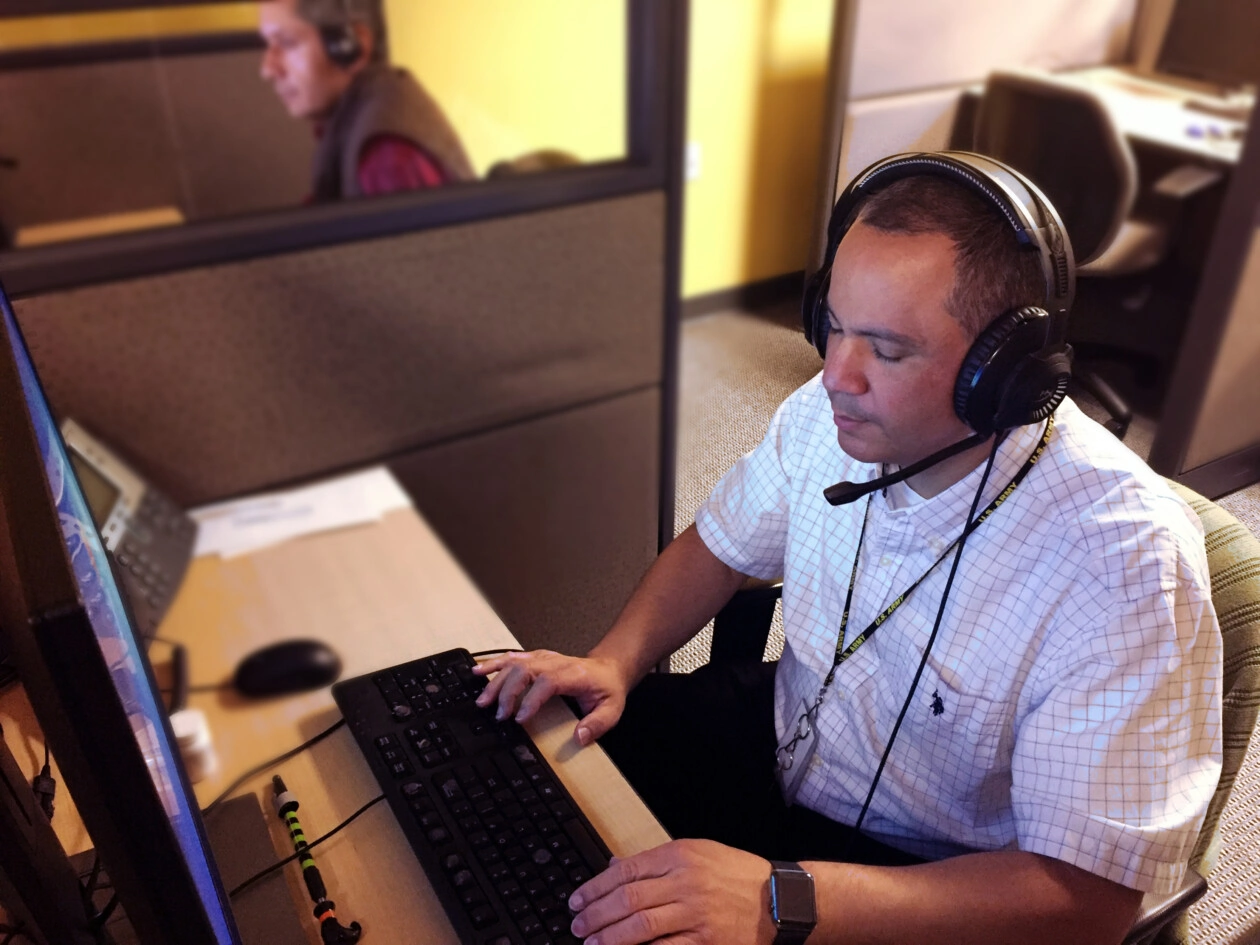Your Genesys Blog Subscription has been confirmed!
Please add genesys@email.genesys.com to your safe sender list to ensure you receive the weekly blog notifications.
Subscribe to our free newsletter and get blog updates in your inbox
Don't Show This Again.

Experts expect eye disorders to double between today and 2050 — leaving almost nine million Americans blind or visually impaired. But a whopping seven out of 10 Americans who are blind don’t have a job, meaning the number of unemployed adults will climb dramatically in the coming years.
Some people say we need more specialised jobs to fill these gaps in the workforce. But there’s no such thing as blind jobs or sighted jobs — only jobs. And with the right processes, technology and training, anything is possible.
A decade ago, I was like a ship without a rudder, working in the private sector in financial services. I was miserable, and although I had a lot of things going for me in my personal life, my professional life didn’t have a north star. I didn’t know how to apply my life in a way that mattered to me.
And then, my company held a seminar for nonprofit leaders, and the CEO of Lighthouse Central Florida (CF) attended. I ended up volunteering with the organisation on a young executives committee, and during my time, I was amazed by the many stories I heard about the measurable impact the organisation made in people’s lives.
Later on, I had a conversation with a director at Lighthouse who was going on leave and thought I would be a good fit for her role. And despite my knowing nothing about blindness, fundraising or nonprofits, they gave me a chance as director of fund development and communications. There, I finally found my north star, and my life transformed.
Lighthouse CF is a nonprofit organisation serving the visually impaired and blind in Central Florida. Whether someone was born visually impaired or blind, or became so later in life, we offer life-changing visual rehabilitation training, educational tools and advocacy.
To sustain our ongoing outreach efforts, we established Lighthouse Works, a subsidiary social enterprise that’s part of our nonprofit mission. We saw a huge need in Central Florida for inclusive, meaningful job positions, which prompted us to create a nonprofit call centre service serving businesses in Florida and beyond. We aimed to create an inclusive space for the blind and visually impaired, allowing them to apply their skills and receive a competitive wage.
We structured Lighthouse Works with what we call a “double bottom line.” First, we wanted to create competitive careers for people who are blind or visually impaired. Second, we wanted to generate re-deployable revenue to fuel the services of Lighthouse Central Florida. It’s a self-propelling model of nonprofit funding that gives us more reach, fuel and visibility.
Lighthouse CF and Lighthouse Works have grown tremendously over the past few years. When I became President and CEO in 2019, we had just 83 employees. Now, we have over 600 employees and counting.
The growth of our contact centre is a massive part of this shift, but the greater success of Lighthouse Works is because of our people and the technology that empowers them.

Technology is a massive component of any call centre, especially one as unique as Lighthouse Works. For example, agents with low or residual vision may use magnification programs on their computers to read or type. Others may use specialised software to navigate programs with less eye strain.
But the most critical technology we use is Jobs Access with Speech (JAWS). JAWS enables people with blindness and vision impairment to understand web pages through a screen reader and navigate their computer interface using only their keyboard. Many of our agents put their JAWS screen reader in one ear and the customer in the other, creating a great customer experience while meeting their handle time goals.
JAWS is critical to our tech stack, but it requires some measure of compatibility. We used to have to ask prospective customers about platform accessibility before entering a partnership. We would then manually evaluate and score each potential customer’s database or CRM system. Sometimes, we couldn’t make it work.
This lack of accessibility prevented us from scaling our call centre even more, so we invested in our own software development team to build customised connections between JAWS and other platforms. Rather than asking about a prospect’s platform (or crossing our fingers and hoping for a good fit), our internal team can forge custom solutions to meet our needs. Middleware helps us integrate JAWS into workflows for individual customers, and we can create an even better value proposition through customised automation and bespoke solutions.
Accessibility and automation offer a substantial competitive advantage in any contact centre. However, in the blind contact centre space, it’s an even bigger deal, and we needed a contact centre solution that would check all the boxes.
We’d had several pain points with our previous provider: QA and workforce modules weren’t built in, scaling was cost prohibitive and their reporting module experienced significant down time. Our existing solution prevented agents from doing their best work, and we struggled to find workarounds. We sought another option that could meet and exceed our expectations.
We vetted numerous vendors, including NICE, but we selected Genesys because its capabilities and sophistication best addressed what we needed. The flexibility of Genesys was a huge factor since their open API would allow our software development team to write code that allows JAWS to interface with Genesys. And right now, we’re building our own user interface to improve that integration and increase accessibility. It’s in beta, but when it’s ready, we anticipate Genesys will add it to the AppFoundry® Marketplace. And that’s an example of the kind of people they are. Rather than prevent us from finding our way to work with their solution, they plan to offer our software as an option for anyone to make their solution more accessible.
The team showed a sincere interest in our work from day one, and collaboration began right away. I was invited to present at Genesys Inspire, spoke on CX Green Room, and have had multiple opportunities to collaborate with team members and utilise their expertise as we grow.
There’s a lot of misunderstanding about what blind or visually impaired people can do in the workforce. The minute our prospects hear we’re a nonprofit for blind agents, the assumption is they’ll have to sacrifice something. But Lighthouse Works starts with value, performance and quality above all else. If we don’t establish that first, a visual impairment shouldn’t even be a part of the conversation. Our competitive advantages exist because of our unique workforce, not despite them.
And we’re not doing anyone any favours, either. Sure, Lighthouse invests in helping people meet the standard, but our employees want to meet the standard because that’s what customers expect and deserve. Many of our employees have lived their entire lives blind and spent decades solving problems with innovative solutions. Their disposition for empathetic listening is massive, and they deserve to work somewhere where they exist as equals.
Aside from our incredible workforce, our training program and long-term careers offer us another competitive edge. Roughly 75% of all agents report to a lead who’s blind, and 75% of those people report to a supervisor who’s blind. I’m proud to say Lighthouse Works created more than 25% of all new blind jobs in the US last year, with an attrition rate of less than 4%. In a contact centre environment, that’s almost unheard of. Low attrition makes us more cost-effective and means we’re developing more subject matter experts. We’re helping agents survive and thrive with vision loss, which benefits everyone involved.
Lighthouse Works has grown so quickly and dramatically that it’s imperative to have a strategic partner like Genesys. I’ve never worked with a technology vendor that’s so enthusiastic about partnership, or one that responds so quickly and robustly to our needs.
Genesys has measurably increased our ability to provide a stable platform with open APIs, allowing us to “bolt on” custom code and enjoy improved performance and value. As we explore new opportunities and the Genesys AppFoundry, we also hope to make Lighthouse Works more marketable to existing clients and prospects.
Our employees love Genesys, and there’s more to come. I believe Lighthouse Works can become the largest and most preferred employer for people who are blind. And with a partner like Genesys, we have a virtually unlimited capacity to do just that.
Subscribe to our free newsletter and get the Genesys blog updates in your inbox.